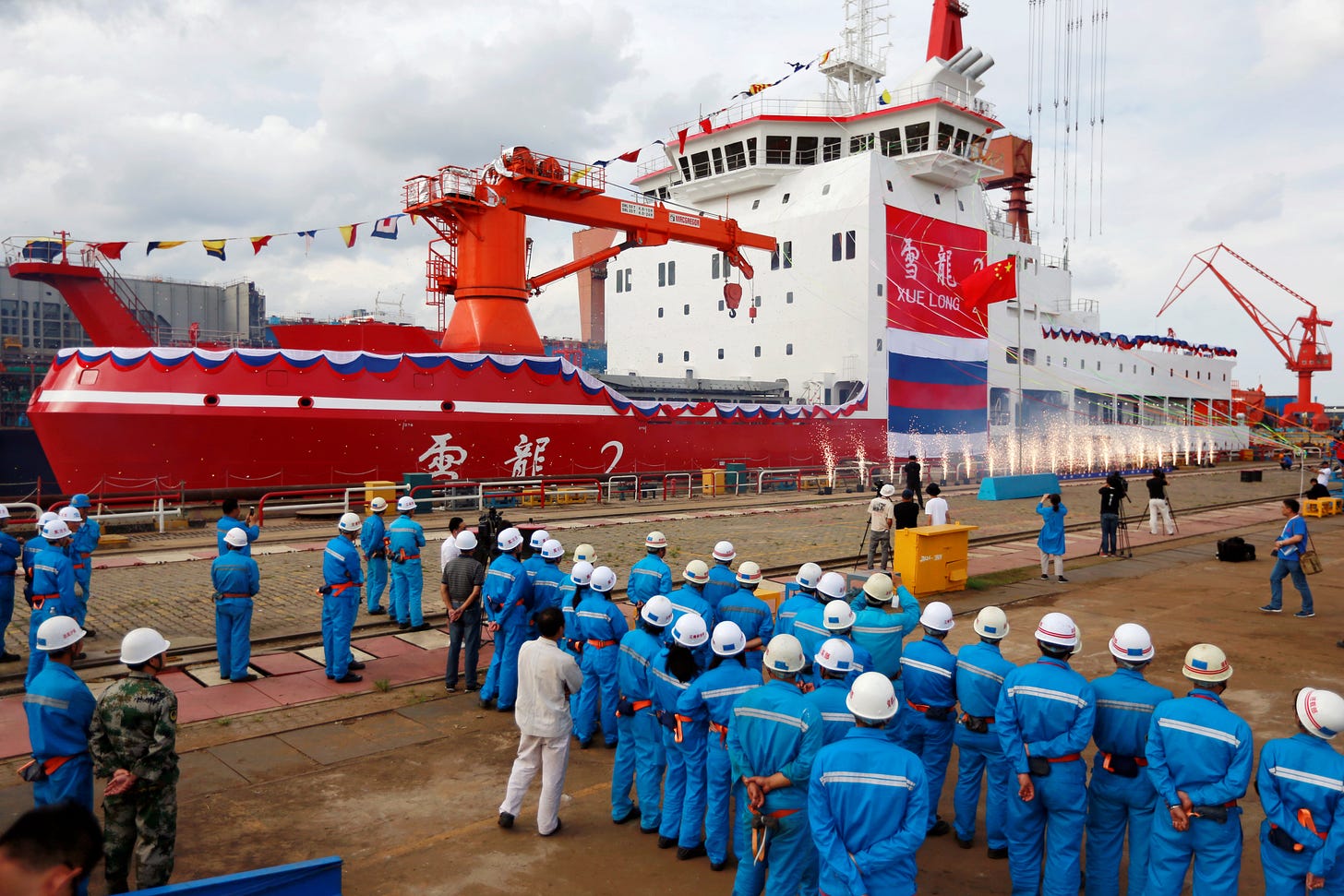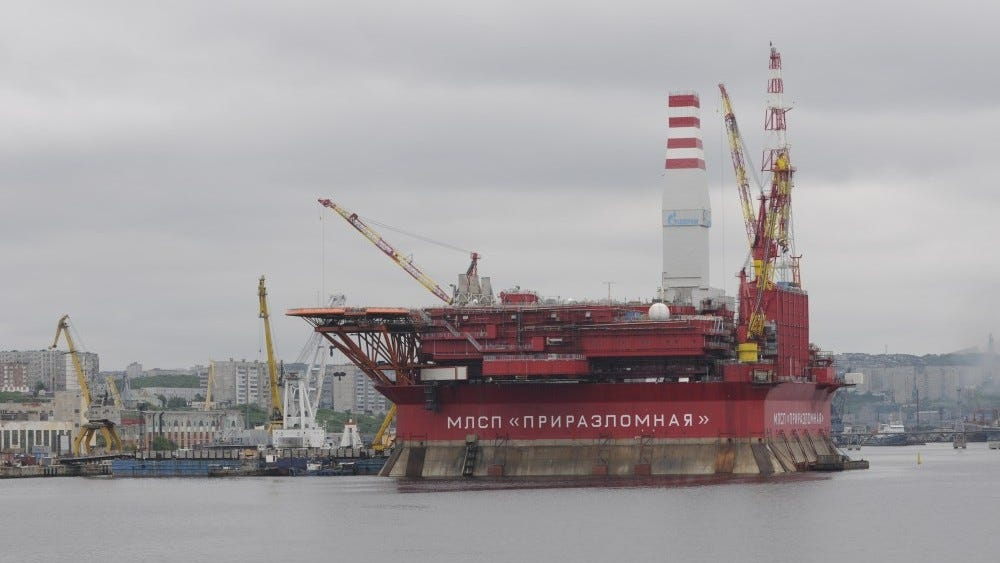The U.S. is No Match for Russia when it comes to Arctic Warfare
On the importance of the Arctic in the geopolitics of WWIII
In a recent article, I raised the question of whether the U.S.´s alleged sabotage of the Russia-Germany Nord Stream pipeline means that we`re now officially in the midst of WWIII.
Now, to be fair, I know a lot of my audience believes, as I do, that we now live in a globalized world where the economies of the different competing nation-states are too integrated for them to engage in full-on war. It follows, then, that the war is, to a certain extent, being waged on false premises.
It is very hard to say, for instance, who WWIII is between. Is it between NATO and BRICS? Well, Germany is a NATO country and they were heavily invested in Nord Stream. Yet the U.S., assisted by Norway, who is also a NATO member, blew up a strategically important pipeline. Isn`t that an attack on Germany? Is NATO then at war with itself? And why is Russian gas still flowing to Germany? Wouldn`t Russia be playing its cards differently if they were trying to win this war?
In that post, I raised certain questions about a subject that I haven`t seen many people talk about in the independent media: Arctic warfare.
Specifically, I raise the possibility that Russia might intend to take control of Arctic shipping routes, and suggest that China is likely to support Russia`s Arctic ambitions whilst simultaneously pursuing its own interests.
After writing that article, I kept investigating, becoming increasingly convinced that Russia has a major advantage over the U.S. so far as Arctic warfare is concerned. It seems to me that Russia has an ace up its sleeve. Personally, I can`t think of why they wouldn`t use it.
Whether or not the NATO-BRICS proxy war spreads beyond the borders of Ukraine, and whether or not the current geopolitical conflict is comparable to previous world wars, I still think that studying the global balance of military power is key to understanding geopolitics.
Taking a good hard look at the Arctic really changes the picture that one sees when one looks at geopolitics. For this reason, I decided to share some of what I`m learning along the way.
I don`t claim to know what the future holds. My best guess is that we are in the midst of a recalibration of power necessitated by the declining power of the Anglo-American world empire relative to that of China and Russia.
That said, I understand that there are now powerful transnational corporations, as well as various supranational political institutions such as the U.N., the World Economic Forum, the I.M.F., World Bank, and the Bank of International Settlements. WWIII will not be waged only by militaries, who answer to a political class, but by many players who are not under the direct command of any government.
So how exactly we are to conceive of how exactly WWIII will be waged? I honestly don`t know, and I think it`s one of the big questions facing us right now. So far, WWIII has been a propaganda war more than anything else. It seems clear that the governments of the world intend to use monetary policy to usher in a new economic system, as seen by the fact that central banks of many different countries are moving in lockstep to roll out new digital currencies.
It does seem, therefore, that WWIII will be a class war, a war between the people of the world and the governments that rule over them. But it would be foolish to think that this means that real soldiers won`t die in real battles between real armies. One of the reasons to go to war is to terrify one`s subjects into submission. And it`s a lot easier to frighten people when people really are dying. So I know that a lot of people want to believe that the Ukraine war is just a show, but the fact is that in order for it to serve its purpose of transforming the world, large numbers of human beings will be shoved into the meatgrinder.
Or at least that`s how it`s always worked before.
FIVE THINGS YOU (PROBABLY) DIDN`T KNOW ABOUT THE ARCTIC
1. Yes, Russia is definitely building up its capacity for Arctic warfare.
A 2017 article in Foreign Policy states:
In recent years, Russia unveiled a new Arctic command, four new Arctic brigade combat teams, 14 new operational airfields, 16 deepwater ports, and 40 icebreakers with an additional 11 in development.
2.Russia is already shipping tens of millions of tons of cargo across trans-polar shipping routes.
According to the same Foreign Policy article quoted above:
The cabinet headed by Premier Mikhail Mishustin continues to aim for an unprecedented boost in Arctic shipping, and the ambitions outlined in the federal Plan on the development of the Northern Sea Route as adopted in August 2022 remains intact.
The document says shipping on the route is to increase to 80 million tons in 2024 and later to 150 million tons in 2030 and 220 million tons in 2035.
The same article quotes the Russian deputy prime minister claiming that Russian ships transported 34 million tons across the Northern Sea Route in 2022. It also explains that in order for Russian companies to reach the ambitious targets, a total of 41 new cargo vessels must be built by 2030.
3.Russia has the best fleet of icebreakers in the world.
Icebreakers, a specially-designed class of ship, are key for getting around in the Arctic Ocean. The (U.S.) Coast Guard says it needs six to cover responsibilities at the North and South Poles. And not only do they cost a billion dollars each to build, they also take up to 10 years to build. And not only does the Russian navy lead the world in nuclear-powered polar-class war ships, Russia is also currently the only nation in the world that operates a fleet of civilian nuclear-powered vessels. Why is this important, you ask? As this article explains:
Nuclear power has the advantage of long range and massive power, compared with diesel-electric or gas-powered engines that will have to either carry a lot of fuel or make many fuel stops during a voyage. Along the Northern Sea Route, or in the High Arctic, infrastructure and fuel deposits are rare.
It`s also worth pointing out that liquified natural gas (LNG) needs to be cooled in order to remain in its liquid state, meaning that the energy needs of supertankers must account for refrigeration.
4.China has recently gotten into the icebreaker-manufacturing business.
Back in 2019, Arctic Today reported on the launch ceremony of the Xue Long 2, China`s first domestically-produced Polar icebreaker.
The article states:
China is set to become only the second country after Russia to operate a nuclear icebreaker, and its first such icebreaker will rival Russia’s largest nuclear icebreakers in size…
A nuclear icebreaker will further enhance China’s ability to navigate the Arctic Ocean even during winter. With a displacement of more than 30,000 tons the proposed vessel will be just slightly smaller than Russia’s newest and largest icebreakers of the Arktika class.
China’s plans to build a nuclear icebreaker are just the latest step in its efforts to pursue a more active role in the Arctic. The country released its first-ever Arctic policy in early 2018 followed by the launch of its second conventional icebreaker in September. About two dozen Chinese vessels transited Russia’s Northern Sea Route in the last five years, more than any other country except Russia. It is also a large investor in Novatek’s Yamal LNG, a major natural gas project.
5. Russia recently gave leading gas company Gazprom the right to start its own army.
Pardon me. Maybe I`m overstating things. Apparently ¨private military company¨ is the correct term.
According to The Independent Barents Observer, on February 4, 2023, Russian Prime Minister Mikhail Mishustin signed an order allowing Gazprom Neft to establish a private military company. As the article explains:
Gazprom Neft is the oil-producing subsidiary of Gazprom. The company holds many licenses in Siberia, including fields in the Yamalo-Nenets and Khanty-Mansi autonomous areas. In the European Arctic, Gazprom Neft is the owner of Prirazlomnoye, Russia’s only offshore oil production in the eastern Barents Sea.
The article goes on to explain:
The existence of private military groups has gained attention both in and outside Russia following the Wagner Group’s brutal violence in Africa and Ukraine. The Wagner Group’s paramilitary unit of mercenaries is financed and owned by oligarch Yevgeny Prigozhin, a criminal who served nine years in jail for robbery before establishing close ties with Vladimir Putin.
There are several other ragtag groups that operate as small private armies, but with close ties with the Defence Ministry and Russian military intelligence service (GRU).
One such is the Patriot, affiliated with Defence Minister Sergey Shoigu.
Gazprom Neft will be the first in the Arctic formally allowed to have its own private military company (PMC).
In the order, Prime Minister Mishustin points to the law on Fuel and Energy Complex facilities and grants “the right to establish a private security organization” – the same designation as used for the Wagner Group.
Soo… A major gas company has been given a licence to start its own army. What could possibly go wrong?
Anyway, this article is mostly intended to organize my thoughts, so I will keep my closing words brief.
Really, what I am trying to do is to understand what WWIII will look like. The world has changed quite a lot since 1945, but the fact of the matter is that war is not obsolete. As Mao said, political power grows out of the barrel of a gun. The fact that we now live in a globalized world does not mean that the age of warfare is behind us.
What it does mean is that WWIII will be between rivals who are partly dependent upon one another. But it doesn`t mean that the contenders won`t truly be competing, or that the end result can be known ahead of time.
What does it mean? That`s what I`m trying to figure out.








I took the liberty of translating this and your former article into French and publishing them on my blog:
http://skidmark.blog/2023/02/22/si-les-etats-unis-ont-vraiment-fait-exploser-nord-stream-cela-signifie-t-il-que-cest-officiellement-la-troisieme-guerre-mondiale-par-nevermore-media/
http://skidmark.blog/2023/02/22/les-etats-unis-ne-font-pas-le-poids-face-a-la-russie-en-matiere-de-guerre-arctique-par-nevermore-media/
Hope that's ok with you.
Good job, looking forward to read more from you.